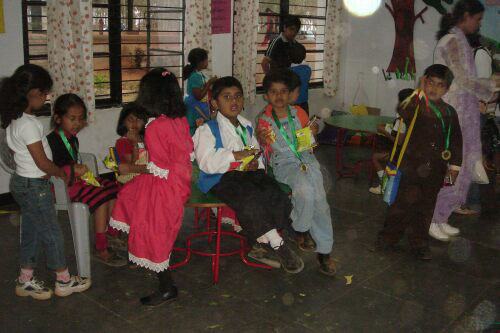「夫と息子は英語」「夫と娘はベンガル語」
「私と子どもは日本語」「息子と娘も日本語」を使っています。
My son speaks English with my husband, my husband speaks Bengali
with my daughter, I speak Japanese with my children. My kids speak Japanese to each other.
<筆者のコメント>
ご主人と智子さんは、英語で話されているそうです。
(Tomoko and her husband speak English to each other.)
QUESTION:
ご家庭自体がまさに、インドの多言語社会ですね。何か気を付けていることはありますか。
In some respects, your home represents India, with all those different languages.
So, is there anything that you're careful not to do, in terms of the languages you use at home?
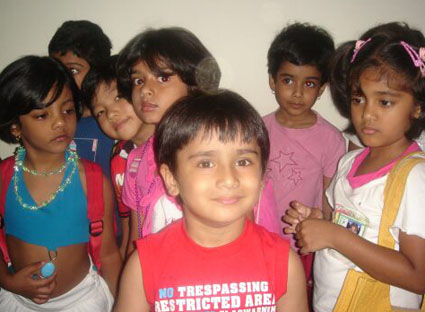
|
|
インドの子どもたち
|
そうですね、ごちゃまぜにしないことでしょうか。例えば、私と夫が普段使ってしまっている
「日本語と英語を混ぜての会話」(「そこに置いて」というときに「そこにputして」など)を子どもたちには使わないようにしています。
小さいうちは特に、親の言葉をそのまま真似て覚えてしまうため、私も夫も「日本語なら日本語」
「英語なら英語」ときちんと使うよう心がけています。
Yes. I try not to mix languages. But my husband and I do sometimes mix Japanese and English.
Say, for example, "Sokoni oite (Can you put it there?)" can become " Soko ni put shite." But I try not to use these phrases with my kids,
because I know that they learn as we speak.
QUESTION:インドが多言語社会であることは有名ですが、実際現地の子供たちはどのように言葉を使い分けているんですか。
India is famous for all its different language. How do children handle this kind of environment?
Tomoko-san:
その土地にもよりますが、例えば学校では英語、第二言語としてヒンディー語、家族とは母語
、お手伝いさんや外の人とは現地語、などといくつかの言語を使い分けています。
Well, it depends on the situation. Normally, they use English at school, with Hindi as a second language,
their mother tongue with their family and local language with others. They speak different languages depending on the situations.
QUESTION :
そうですか。 逆に日本の子供はそのような多言語を使い分けることなく生活しているケースがほとんどですが、それについてどう思われますか。
In Japan, most kids don't have to deal with more than one language. What do you think about this?
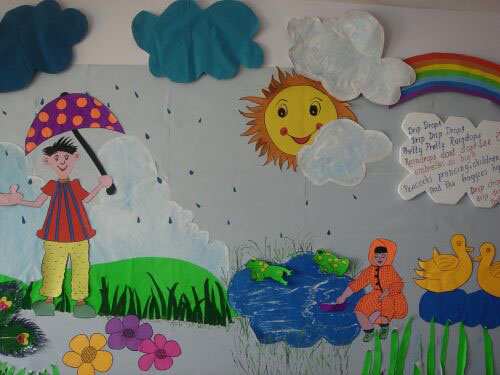
|
|
教室の壁(ヒンドュー語と英語の詩がある)
|
Tomoko-san:
多言語に小さいうちから触れていると、大きくなってからも新しい言語
を吸収しやすくなると思います。日本にいる限り、日本語さえ理解していれば生活に支障ありませんし、
そういう環境の中ではよほどの興味がなければほかの言語を習うのは難しいと思いますね。
I think it's easier to learn new languages if you are in multilingual society.
But if you are in Japan, you don't need to learn other languages. It would be difficult to learn foreign languages.
QUESTION:
日本の小学校でも英語が必須科目になるかもしれません。これに対してどう思われますか。
In Japan, English might become a compulsory subject at elementary school. What do you think about this?
Tomoko-san:
英語に限らず、どの言語も使わなければ上手くならないと思います。私自身、中学から大学まで英語を勉強したはずですが、まったく身に付いていませんでした。
英語が小学校からの必須科目になっても、教科書・文法中心の授業では、これまでと同じで意味がないのではと思います
You can't expect any progress with English if you don't use it. I studied English from junior high to university, but I couldn't master it at school.
I think it's useless learning English at early age if you stick to the usual grammar-oriented way of teaching.
■素朴な疑問
QUESTION:日本の小学校では、
「キーンコーンカーンコーン」というチャイムが鳴りますが、インドの小学校ではどうですか。
In Japanese elementary schools, there's a chime at the end of each class. What about India?
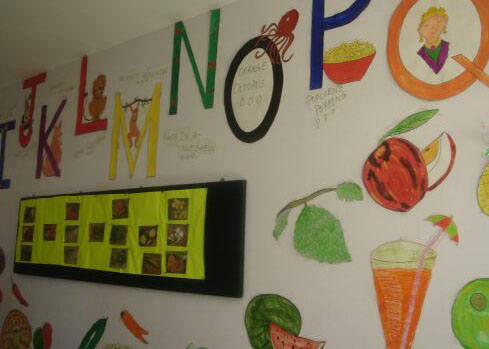
|
|
カラフルな教室の壁
|
Tomoko-san:
息子の学校ではチャイムはなりません。夫が通った学校では終了時にブザーが鳴り、あとは時間になると次の先生が来て交代するだけだったそうです。息子は今6歳で、日本では幼稚園年長、
インドでは1年生なのですがもうすでに科目ごとに先生が分かれています。なので、時間になると次の科目の先生が来て、それが終了の合図のようです。
In my son's elementary school, there is no chime.
My husband told me that there was a buzzer at the end of the class. But generally, if the next teacher comes, it means the end of the class.
QUESTION:先生のことは、どう呼んでいますか。
How do children address their teachers?
Tomoko-san:
女の先生に対しては「マム(マダム)」、男の先生に対しては「サー」と呼んでいます。
They call female teachers "Ma'am" or "Madam," and male teachers "Sir."
■発音について
QUESTION:日本人の先生は、自分の英語の発音にコンプレックスがある人が多く、
「子供に発音を指摘されたらどうしよう!?」という不安を抱えている先生が大勢います。インドではどうですか?
In Japan, there are many teachers who are worried
about their pronunciation. They are scared that kids will notice that they aren't pronouncing things properly.
Tomoko-san:
インドでは、先生は常に尊敬される存在なので、「子供に何かを指摘されるのでは?」などと不安に思っている先生はまずいないと思います。発音についてはあまり気にせず、先生ご自身もWednesday のことをウェネスデーなどとインド英語で堂々と話しています。
日本人も日本語なまりの英語を堂々と話していたら、インド英語のように、市民権を得るのではないかと思うのですが・・・。
That would never happen in India.
Here, teachers are respected by all the kids.
I think there is no teacher who would have such worries.
They don't care about their own pronunciation and they speak
with a strong accent, say, for example, "Wednesday" sounds like "Wenesday."
I think Japanese should speak Janglish as people here speak Hinglish, naturally and unselfconsciously.

|
|
バンガロールの中心部
|
QUESTION:そうですか。
日本と対照的ですね。日本では、「いい」発音を身に付けるべく、
「英会話学校」がたくさんありますが、インドにもありますか。
It's so different! Here there are many "English conversation school" to master "good" pronunciation. What about in India?
Tomoko-san:
大人向けのものは増えつつあります。というのも、ここ数年、
バンガロールではアメリカ企業のコールセンター(※)が増えてきているんですよ。
なので、特に「アメリカンアクセント」を学べる英会話学校が増えてきています。
Yes, there are those schools - but only for adults.
Their numbers are growing - because there are a lot of
call centers outsourced from the States. There are more schools teaching American accents.
********ひとくちメモ********
※アメリカの顧客が企業のコールセンターに問い合わせをすると、その電話は実は、インドにつながり
、現地のインド人が受け答えをするというシステム。
ここ数年、このような「インドのコールセンター」に頼る欧米企業が増えている。
(Make a call to a company in the States,
and you'll often be connected to India where you'll talk to Indians.
This system is becoming more popular among U.S. companies these days.)
■日本の小学校とインドの小学校について
QUESTION:日本の小学校でいいなぁと思われる点、またインドの小学校でいいなぁと思われる点を挙げていただけますか。
What are some good and bad things about Japanese and Indian elementary schools?
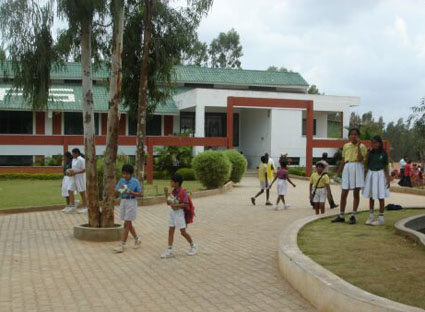
|
|
インドの小学校風景
|
Tomoko-san:
日本の小学校でいいと思うことは、勉強以外の、例えば音楽、図工、
体育にも力を入れていること。 インドの小学校(私立しか知りませんが)でいいと思うことは
、小さいときから国を愛する、誇りに思う教育を行なっていること。独立記念日などの行事の前にはフリーダムファイターについ
て学んだり、 国旗を作ったり、小さいうちからしっかり愛国心を育てる教育を行なっています。インド人は国歌が流れると起立
し、直立不動の姿勢で敬意を払いますが、自分の国を純粋に誇りに思い愛せるということはすばらしいと思います。
<筆者のコメント>
フリーダムファイターとは、イギリスからの独立のために戦った人達のことです。
("Freedom fighters" are the people who fought for independence from British rule when India was still a British colony.)
There are good things about each education system.
For example, Japanese elementary schools teach not only academics, but also music,
art and sports. In India - I know only about the private schools though - they teach the
kids how to love their country and how to be proud of being Indian - particularly around
Independence Day when, they make flags and learning about freedom fighters,
etc. Also, they always stand up when listening to their national anthem.
I think it's great that you love your country.
☆★☆
ヒングリッシュについて☆★☆
ヒングリッシュについては、すでに先月、名和明宏さん
にインタビューをしたときに掲載したのだが、
広いインド。やはり、バンガロールにはバンガロールのヒングリッシュがあるのではないだろうかと予想。
そこで、智子さんにもうかがってみた。
Dr. Aki has already given us an impression of Hinglish in July. Now here's Tomoko on Hinglish in Bangalore.
<智子さんのコメント>インドは広い国なので、英語もその地域によって癖があるようです。
今思いつくだけでもいくつかありますが、これはバンガロールの現地語(カンナダ語)に由来した表現なのかもしれません。それを加味した上で聞いていただければと思います。
As you know, India is such a big country and the kind of English that's used differs from region to region.
The examples below might be only used in Bangalore.
Perhaps it's related to one of the local languages, Kannada.
① 「Actually」が好き-They use "actually" very often.
② 「Simply」を多用する- They also use "Simply" very often.
例)Example: "Simply I came." (突然訪ねてきた人が「ちょっと 寄ってみたんだ」
(used when visiting someone suddenly)
例)Example: "Simply I said." (ただ言ってみただけ---言い訳がましい場合が多い)
(used when making excuses)
③ Wednesdayの発音が「ウェネズデイ」。
④ 強調したい言葉の後に「Only」をつける。
They put "only" after nouns which they want to emphasize.
例)Example:「You only told me.」(「君が言ったんだ」の「君」を
強調する場合)
例)Example:「Where is the meeting?」「Here only.」(「ここ」を強調)
などです。
------------------------------------------------
インド英語教室はこちら(Click here for "Indian kids English")
インドの子どもたちが好きな祝日はこちら(Click here for "Raksya Bandan")



